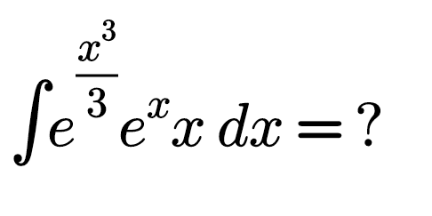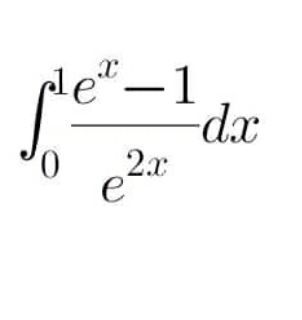
IntegrationQuestion and Answers: Page 130
Question Number 123386 Answers: 1 Comments: 0
Question Number 123361 Answers: 0 Comments: 1
$${please}\:{find}\:{the}\:\int\frac{{e}^{{x}} }{{x}}{dx} \\ $$
Question Number 123352 Answers: 0 Comments: 0
Question Number 123331 Answers: 1 Comments: 0
Question Number 123261 Answers: 1 Comments: 0
Question Number 123255 Answers: 1 Comments: 0
Question Number 123253 Answers: 0 Comments: 0

Question Number 123234 Answers: 3 Comments: 1
$$\:\:\int\:\sqrt{{x}^{\mathrm{2}} −\mathrm{4}{x}+\mathrm{5}}\:{dx}\: \\ $$
Question Number 123177 Answers: 0 Comments: 0
Question Number 123159 Answers: 3 Comments: 0
Question Number 123154 Answers: 3 Comments: 0

Question Number 123060 Answers: 3 Comments: 0
Question Number 123037 Answers: 5 Comments: 0
$$\:\:\int\:\frac{\sqrt{\mathrm{1}−{x}}}{\mathrm{1}−\sqrt{{x}}}\:{dx} \\ $$$$ \\ $$
Question Number 123034 Answers: 1 Comments: 0

Question Number 123033 Answers: 2 Comments: 1
Question Number 122980 Answers: 2 Comments: 0
Question Number 122979 Answers: 1 Comments: 0
Question Number 122976 Answers: 4 Comments: 0
Question Number 122967 Answers: 2 Comments: 0
$$\:\:\int\:\frac{{x}}{\:\sqrt{\mathrm{1}−{x}^{\mathrm{4}} }}\:{dx}\: \\ $$
Question Number 122963 Answers: 2 Comments: 0
Question Number 123023 Answers: 1 Comments: 0
Question Number 123020 Answers: 1 Comments: 0
Question Number 122942 Answers: 2 Comments: 1

Question Number 122940 Answers: 1 Comments: 2

Question Number 122938 Answers: 1 Comments: 1

Question Number 122936 Answers: 1 Comments: 2

Pg 125 Pg 126 Pg 127 Pg 128 Pg 129 Pg 130 Pg 131 Pg 132 Pg 133 Pg 134
